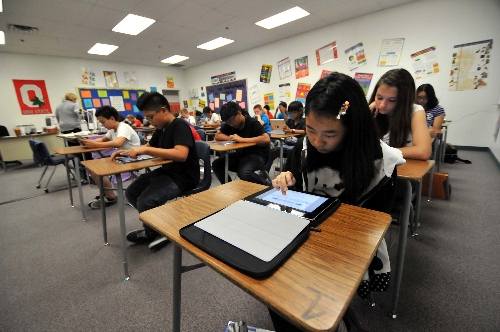School district hopes to improve math scores with iPad pilot program

On a typical Wednesday in Andrea Keller’s eighth-grade algebra class, students took a very atypical quiz.
If anyone would like to use scratch paper, Keller told them, you’re welcome to do so. No one budged. Paper, at least on this day and in this class, was obsolete. Everything a student typically needed —- the quiz, paper and pencils —- was replaced by an iPad.
The Clark County School District is testing a new pilot program at four schools in an effort to improve math proficiency scores. In the past, half the students haven’t passed the exam and therefore couldn’t graduate.
Middle schools participating in the program are Silvestri, 1055 Silverado Ranch Blvd., and Leavitt, 4701 Quadrel St. High schools are Silverado, 1650 Silver Hawk Ave., and the Academy for Individualized Study, 1801 S. Maryland Parkway.
About 1,150 students at the four schools were given iPads instead of traditional textbooks, preloaded with Fuse Algebra textbooks and software. Each iPad costs $687, including software, for a total of about $790,000.
Students can watch more than 400 video tutorials, take notes, get instant feedback on problems they miss and other functions.
After students finished taking the quizzes in Keller’s class, they raised their hands, and their teacher recorded their scores. Students were then instructed to put on headphones and review the video tutorials and do practice problems that correspond with the questions they missed.
Elizabeth Welte, a student in Keller’s class at Silvestri, said she’s already doing better just weeks into the semester.
"I struggled with algebra all of last year because I could never remember and my notes never helped," Elizabeth said. "So having the videos and someone talking to you to teach you how to do it again, it’s a lot of help."
Elizabeth said she was traditionally a C and D student when it came to math, but she’s still at an A so far.
"I wish I had (the iPad) earlier so my grades could have been better before," she said.
Her classmates Annesa Basiga and Ally Truby also said the iPad has helped them in school and not just in math classes. There’s a dictionary they can use in English class, a periodic table for science, a virtual keyboard for taking notes and a homework agenda application.
Annesa said she has been able to email her friend class notes on days she was absent.
"I think it works better, because if we’re doing homework and we need help and (Keller) is not with us, we just use the videos," Annesa said.
When asked if there is anything they miss about textbooks, all three girls answered "no" in unison and on the border of laughing at such a question.
They also said the iPads are much lighter and easier to carry around, and each student can customize the iPad with covers or backgrounds.
Keller said she and other teachers have embraced the change and are seeing positive results.
"I think it’s awesome," Keller said. "They’re really engaged in the class instead of just sitting there."
About 30 schools applied for the program with the district. Silvestri principal Robert Mars said he wanted the iPads because he knew, without question, it would engage students.
"Any tech(nology) we use," Mars said, "a laptop, smart board, iPod Touch, handheld transponder, anything that’s tech-related, kids gravitate toward that. Every child is engaged constantly by having them in their hands."
Leavitt principal Keith Wipperman said students have come up to him in the hallway, thanked him and shown him all the neat things they’re able to do on their iPads.
"I could see their eyes light up when they heard about this," Wipperman said. "The teacher still makes all the difference in the world, but if I can help them engage kids even more, I’m going to put it in the kids’ hands and give it a shot."
Principals and other administrators have a "powerful watchdog program," Wipperman said, to monitor activity. They can track the iPad’s location, the data and test scores, the number of hours spent reading the textbook, and they can even shut them down if they need to.
Parents had to sign documents stating they are responsible for their child’s iPad for the school year. The district said the program’s future, and whether it would be expanded or not, will be determined by this year’s results.
Contact View education reporter Jeff Mosier at jmosier@viewnews.com or 224-5524.